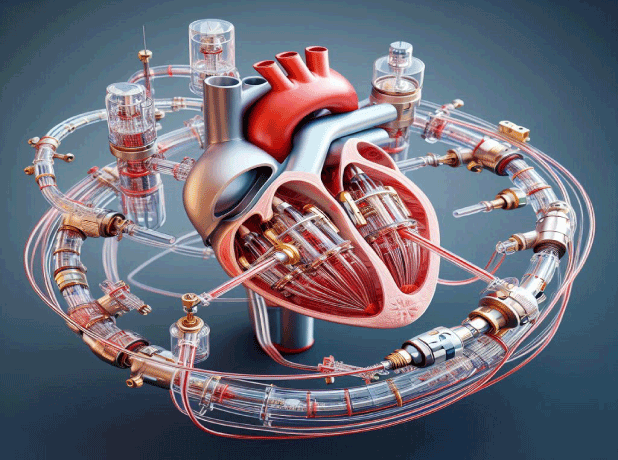
Abstract
Background/Objectives: Mechanical circulatory support (MCS) is increasingly utilized for the management of acute decompensated heart failure (HF) and cardiogenic shock (CS). The primary goals of MCS are to restore systemic perfusion, reduce cardiac workload, and support end-organ function. A thorough understanding of cardiovascular physiology in patients supported by MCS is essential for clinical decision-making. This review summarizes current evidence on the physiological effects of various MCS devices, key monitoring techniques, patient management, and explores the emerging role of artificial intelligence (AI) in this field.
Main Text: Short-term MCS devices include intra-aortic balloon pumps (IABP), percutaneous left-sided devices such as Impella (Abiomed, Danvers, MA, USA) and TandemHeart (LivaNova, London, UK), percutaneous right-sided support devices like Protek Duo (LivaNova, London, UK) and Impella RP Flex (Abiomed, Danvers, MA, USA), and veno-arterial extracorporeal membrane oxygenation (VA-ECMO). Long-term support is mainly provided by left ventricular assist devices (LVADs), including the HeartMate 3 (Abbott Laboratories, Chicago, IL, USA). Optimal MCS application requires an understanding of device-specific cardiovascular interactions and expertise in appropriate monitoring tools to assess device performance and patient response. The choice of device, timing of initiation, and patient selection must be individualized, with careful consideration of ethical implications. The integration of AI offers significant potential to advance clinical care by improving complication prediction, enabling real-time optimization of device settings, and refining patient selection criteria.
Conclusions: MCS is a rapidly evolving field that requires a comprehensive understanding of cardiovascular interactions, careful selection of monitoring strategies, and individualized clinical management. Future research should address current device limitations, clarify device-specific clinical applications, and assess the validity of AI-driven technologies.
